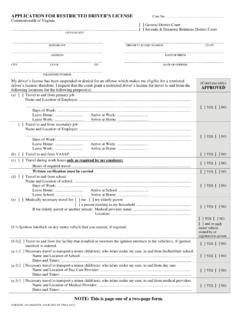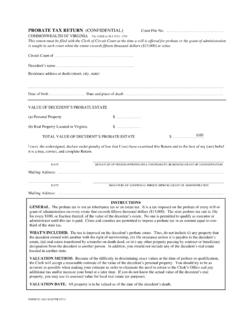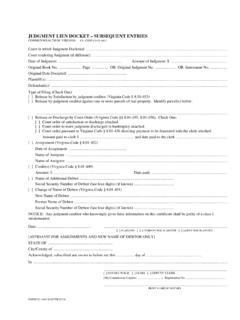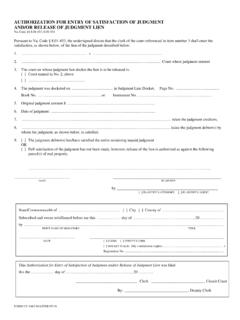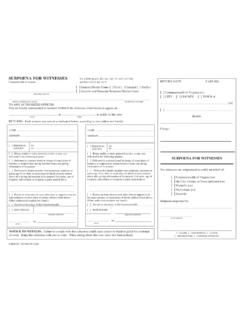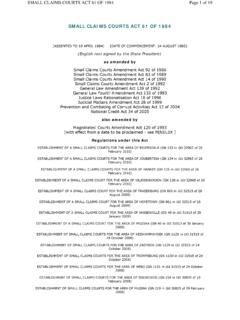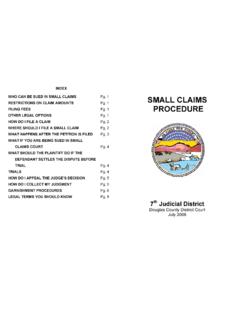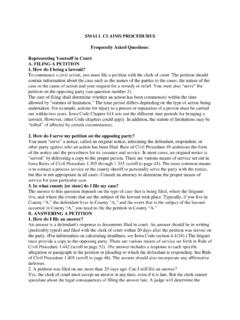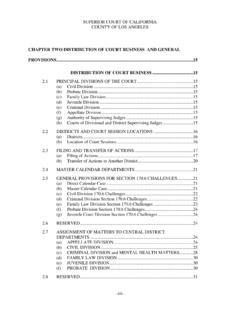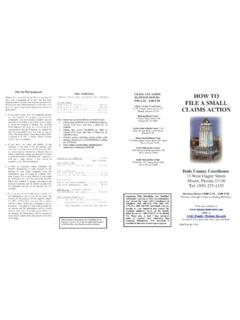Transcription of Small Claims Court Procedures - Judiciary of Virginia
1 Small Claims Court Procedures An Overview Of Small Claims Litigation The jurisdiction of a Court is the power of that Court to hear and decide a particular type of case. The Small Claims Court has jurisdiction over civil cases in which the plaintiff is seeking a money judgment up to $5,000 or recovery of personal property valued up to $5,000. In trials before the Small Claims Court , witnesses shall be sworn. The judge shall conduct the trial in an informal manner so as to do substantial justice between the parties. The judge shall have the discretion to admit all evidence which may be of probative value although not in accordance with formal rules of practice, procedure, pleading or evidence, except that privileged communications shall not be admissible.
2 The object of such trials shall be to determine the rights of the litigants on the merits and to dispense expeditious justice between the parties. The successful plaintiff in a civil case will in most cases be awarded a money judgment as compensation for the defendant s wrongful act. The judgment is judicial recognition that the defendant is indebted to the plaintiff for a particular sum of money. The plaintiff is never assured of actually receiving the money, however, since the judgment can only be enforced out of property belonging to the defendant. Remedies to enforce judgments are available, but a defendant in a civil case is not subject to criminal sanctions for failing to pay a money judgment.
3 Preparing To File Suit In Small Claims Court Locating the Defendant s Correct Name and Address It is essential in filing suit that the plaintiff know the defendant s current address. Businesses that are trading under an assumed name are required by law to file a fictitious name statement in the clerk s office of the local circuit Court . For example, if John Doe is doing business as Doe Jewelry, he would be sued under the name John Doe trading as Doe Jewelry. John Doe should have on file in the circuit Court a fictitious name statement, indexed under Doe Jewelry, and listing the real name of the owner of the business, the name of an agent if the owner resides elsewhere, and an address where the owner or agent can be found.
4 For another example, if Jane Roe owns a corporation called Roe Corporation that is doing business under the name Roe Jewelry, a suit would be brought against Roe Corporation trading as Roe Jewelry. The fictitious name statement would indicate that Roe Corporation owned Roe Jewelry and would list an address for the corporation as Roe Corporation, c/o Jane Roe, 102 Park Street, Roeville, Virginia . If the defendant is known to be a corporation, a simple way to locate the address is to call the registered agent division of the State Corporation Commission in Richmond, (804) 371-9967. That office will provide the name and address of the corporation s registered agent.
5 The address needed to bring suit against the corporation is, for example, XYZ Corp., c/o John Doe, Registered Agent 1402 Fish Lane, Fishtown, Virginia . Providing as complete an address as possible will enhance the possibility of successful service of process, so include the name of the city or county, zip code and apartment number, if any. A post office box number alone is insufficient for service. If the defendant is an individual and the home address cannot be located, a work address will suffice, although a home address is preferable. Filing Suit In Small Claims Court In the Small Claims division of the general district Court , the plaintiff will be requested to fill out a civil warrant or a civil summons form which contains space for the details of the claim .
6 If the plaintiff is seeking only a money judgment, he or she should prepare and file a warrant in debt. If the plaintiff is seeking to obtain possession of specific personal property that the plaintiff Claims is being wrongfully withheld by the defendant or that was given by the defendant as collateral to secure a loan now in default, the plaintiff should prepare and file a warrant in detinue. The form may be filled out by a nonlawyer representing himself or herself (see The Question of Representation, discussed later). The plaintiff will need to bring to the clerk the following: (1) the name of the defendant, (2) the current address of the defendant, (3) the amount of the plaintiff s claim , (4) the basis of the claim , and (5) sufficient funds to pay the filing fee and any sheriff s fee for serving the warrant.
7 The amount required may vary, depending upon the Court , so you may want to inquire with the Court about the cost. The fees must be paid in cash, by certified check, or by money order. If you are preparing a civil warrant, you should make two extra copies, one to keep for your own records and one to mail to the defendant, in addition to the number of copies requested by the clerk for processing by the Court . In preparing a warrant in debt, the claim must specify a dollar amount and the reason for the claim . In preparing a warrant in detinue, the plaintiff must describe the specific property being sought, state its value, and state the basis of the claim for possession of the property.
8 One additional step is taken by careful plaintiffs. A copy of the civil warrant is sent by first-class mail by the plaintiff to the defendant at least ten (10) days before the date when the plaintiff and defendant are to come to Court for their first appearance in the dispute. Further, the plaintiff fills out a Certificate of Mailing, which is either delivered to the judge at the trial or delivered to the clerk s office before the date of the trial. Otherwise, the plaintiff cannot get judgment on the trial date if the defendant fails to come to Court (which happens frequently), and the case will be continued until the ten-day notice requirements have been met.
9 Service of Process After the clerk completes the clerk s portion of the civil warrant prepared by the plaintiff, the papers are sent to the sheriff of the county or city where the defendant is located or the plaintiff may utilize a private process server to serve the papers on the defendant. A deputy of the sheriff s department or a private process server will deliver the civil warrant to the defendant, thus providing notification of the suit. This notification is called service of process. If the civil warrant lists the defendant s home address, process may be served by the deputy sheriff or private process server delivering the civil warrant to the defendant or to any member of the defendant s family age sixteen years or older who is present at the defendant s usual place of abode (usually his or her home).
10 If neither the defendant nor anyone in the defendant s family can be located, the deputy sheriff or private process server may post (attach) the civil warrant to the front door of the defendant s usual place of abode. In some cases, the deputy sheriff or private process server will not be able to serve the papers by the above methods. The papers then will be returned to Court with the deputy sheriff s or private process server s written statement that the defendant was not found (that he or she was unable to serve the papers on the defendant). Without service of process having been made, the Court cannot try the case. If you are suing a corporation, an out-of-state defendant, or if service of process cannot be made by the deputy sheriff or private process server, you should contact the clerk to inquire how service of process may be issued and what fees (if any) are involved.

